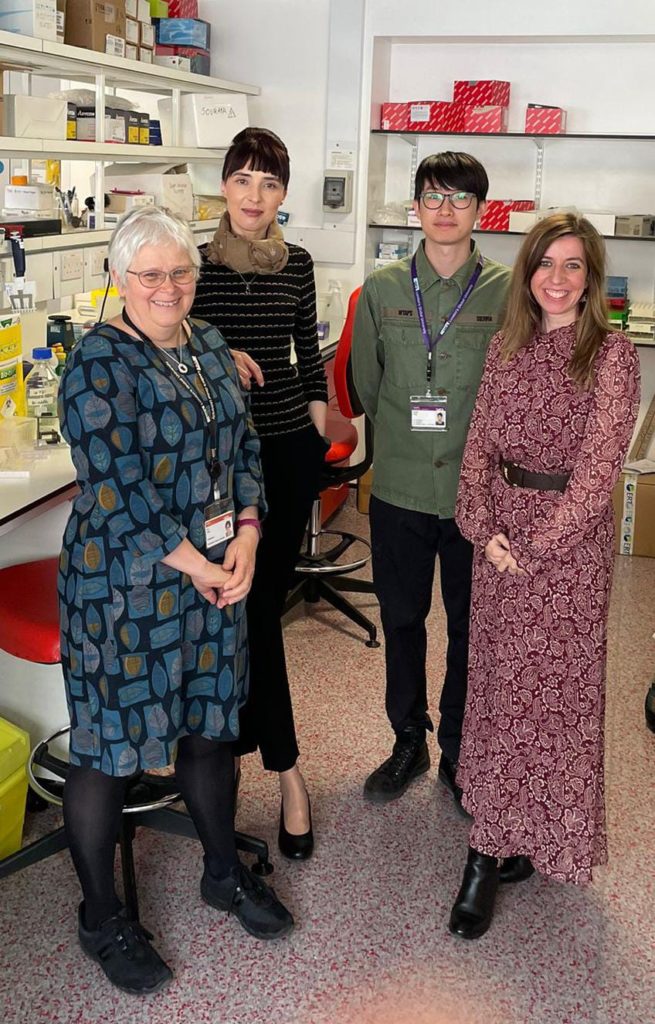
Summary
Sjögren’s syndrome is a disease where the immune system attacks healthy cells in the glands, leading to dry eyes and mouth but can affect other parts of the body such as joints, lungs, skin and nervous system. Although we can ease the symptoms, we don’t have any good treatments. Dr Elizabeth Jury, Dr Coziana Ciurtin and Lucia Martin-Gutierrez, with their team at UCL, looked at the blood of patients and found their immune systems behaved in two different ways. Identifying these two groups will help us treat this uncomfortable disease.
A sandwich is not an easy thing for a Sjögren’s syndrome patient. If you can imagine eating a sandwich with no saliva; it’s not much fun.
Dr Elizabeth Jury
Imagine eating a sandwich with no saliva
Sjögren’s syndrome (pronounced show-gruns) is one of a collection of diseases called autoimmune rheumatic diseases, where the immune system starts attacking healthy cells in the body instead of only fighting bacteria and viruses. The disease is more common in older people, affecting one in seven 70-87 year-olds. Because the overactive immune cells particularly attack glands, Sjögren’s syndrome is characterised by dry eyes and a dry mouth as well as fatigue and joint pain.
A dry mouth might not sound like a big deal, but it can really impact on quality of life. Before the COVID pandemic, we hosted in-person events with patients to talk to them about our research, and we ordered sandwiches for lunch. We quickly realised that a sandwich is not an easy thing for a Sjogren’s syndrome patient. If you can, imagine eating a sandwich with no saliva; it’s not much fun.
Is Sjögren’s the same for everybody?
Right now, doctors can only treat the symptoms of Sjögren’s syndrome, with artificial tears or saliva for example, as there are no treatments for the underlying causes. Drugs we thought might be effective didn’t perform well in clinical trials as only some of the participants experienced any benefits, while other participants didn’t see any effects.
We wondered whether there‘s a biological reason why patients with the same disease are reacting differently to the same drug. Is the immune system of all Sjögren’s syndrome patients overreacting in the same way, or are there differences?

One diagnosis, two diseases
To study the immune system, we took blood samples from 88 patients with Sjögren’s syndrome or the closely related disease, systemic lupus erythematosus. We looked at 29 types of cells, each performing a slightly different role in the immune response, and counted how many of each cell type our patients had. Analysing this data across many cell types was a challenging task, and we couldn’t have done it without our bioinformatician, Junjie Peng. It’s true what they say that science is a team effort, and we need people with different skills in research.
We found that we could divide our patients into two distinct groups based on how their immune system is behaving. These two groups have different numbers of the various types of immune cells, but we don’t yet know whether the cells are acting differently or how this affects the immune system overall. We want to get a clearer picture of the biological differences between the two groups of patients, so we will soon be looking at the genes and the chemistry inside each of these cells.
Science is a team effort, and we need people with different skills in research.
Lucia Martin-Gutierrez
Taking the stress away
We’re sharing our findings with patients through events, who are really engaged with our research. There is no cure for Sjögren’s syndrome, so patients want to hear any results we find. The team at The Dunhill Medical Trust have helped to promote our events so we can share our findings further and throughout the pandemic. Despite the pandemic being a stressful time for us and research, they took a lot of the stress away by giving us the flexibility to adapt our plan.
Despite the pandemic being a stressful time for us and research, The Dunhill Medical Trust took a lot of the stress away by giving us the flexibility to adapt our plan.
Dr Elizabeth Jury
Having discovered that not all people with Sjögren’s syndrome have the same overactive immune system, we plan to retest the drugs from past clinical trials to see whether the reason why it works for some patients and not for others matches up with our two subgroups. In the future, we’re hoping to use this research to develop more effective treatments for patients with Sjögren’s syndrome.
Find out More
For more information, you can read about our work in our recent publications. If you are interested in participating in our engagement events email: [email protected]

